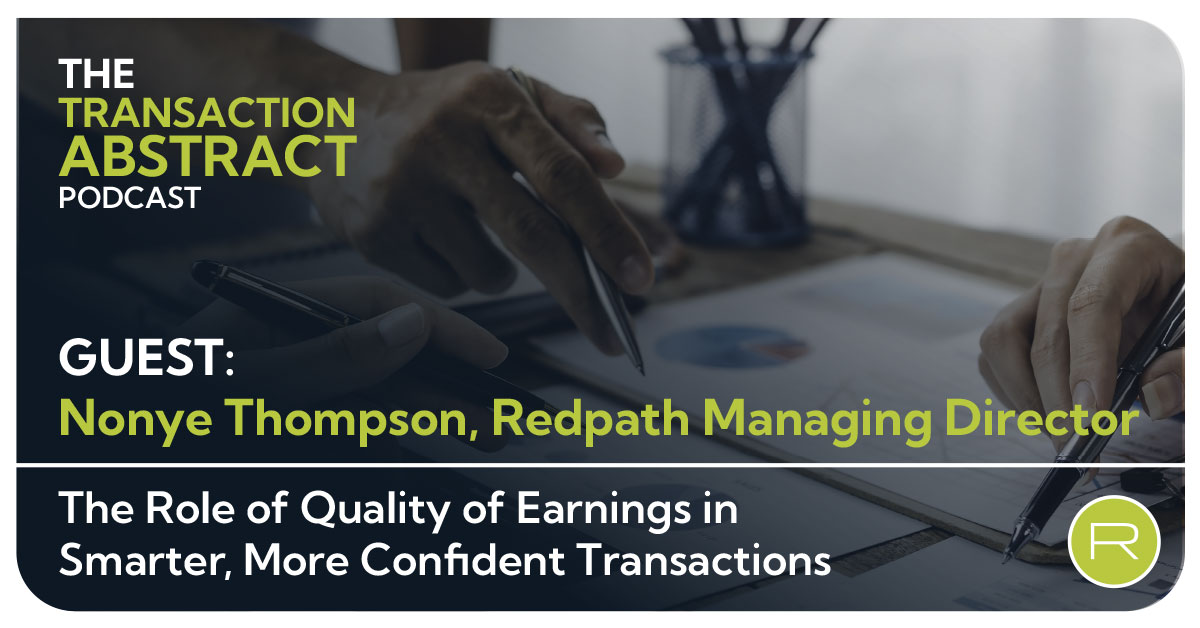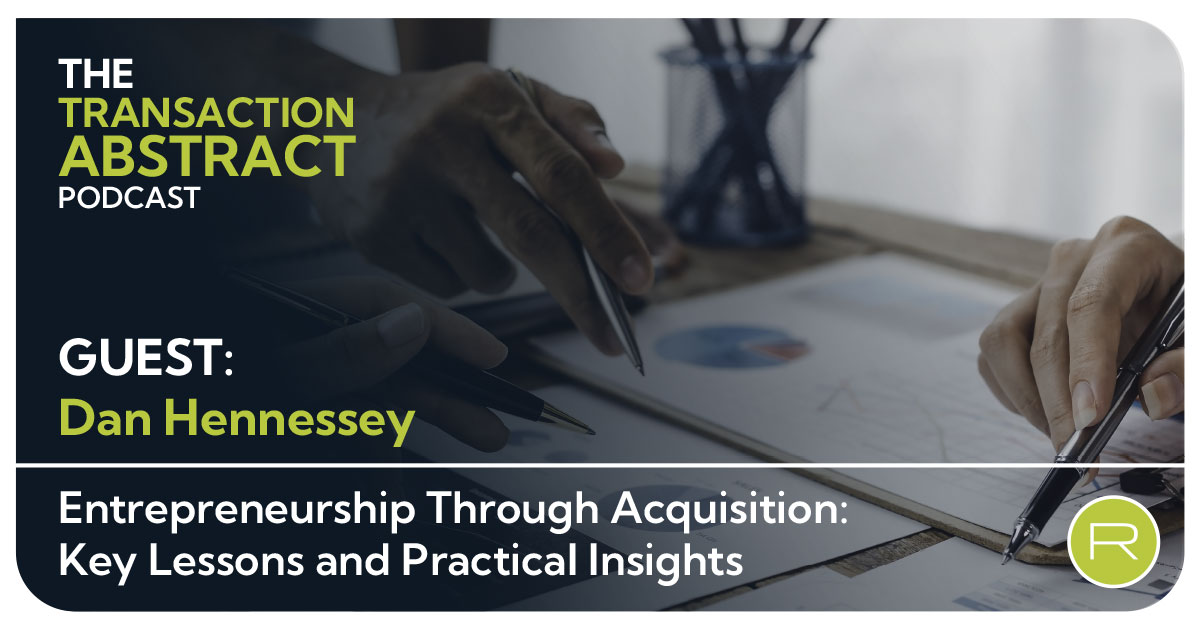The Role of Quality of Earnings in Smarter, More Confident Transactions
In this episode of The Transaction Abstract Podcast, Joe Hellman sits down with Nonye Thompson, Managing Director in Redpath’s Transaction Advisory...
3 min read
 Redpath and Company
:
Sep 17, 2021
Redpath and Company
:
Sep 17, 2021
![What is a Retrade in an M&A Transaction and Can You Prevent It? [PODCAST]](https://www.redpathcpas.com/hubfs/AdobeStock_413996293_adobespark.jpeg)
As a business owner, entering into a sell transaction can be a bit overwhelming. Now imagine you are getting to the doorstep, days or weeks away from closing, and the buyer notifies you that they are not going to pay as much money as you initially agreed to. You may ask yourself, “Can they do that?” Or “Why would they do that?” The short answer is, they can try. It is called a retrade.
A buyer agrees to a price in principle with the seller, and as they get deeper into the purchasing process, they inform the seller they intend to pay less than the agreed amount. Or they at least want to pay less, for whatever reason, and try to negotiate the purchase price down.
On this episode of The Transaction Abstract, Redpath’s Joe Hellman talks with Mo Gharib, partner at Vermillion Capital, about the perils of a retrade and how to avoid them. Vermillion Capital is a Minneapolis-based boutique investment bank focused on M&A advisory services for privately-held, middle-market companies.
Listen to this week's episode:
If you are the seller, pressure and stress build as you get closer to the finish line. That affects your entire team – your internal team, accounting and tax advisors, attorneys, and other M&A advisors. Retrading exacerbates the tension, and no one wants that.
There are several reasons a buyer could waffle on the purchase price. They might discover something during due diligence that indicates the company is worth less than agreed. For example, an unrecorded liability like a $200,000 expense against a six times multiple could impact the deal to the tune of $1.2 million. That is a legitimate concern. The buyer may try to reduce their cost by that entire amount, or they may try to at least negotiate it down.
On the other hand, sometimes, a buyer will try to reduce the purchase price simply to score an extra “win” during negotiations. They have signed a letter of intent, so they know you cannot negotiate with any other prospective buyers. Any leverage you had prior to that has now shifted to them, and retrading can be an effort to exert that leverage. So they try to poke holes in your valuation story.
Buyers generally fall into three categories:
Any one of them may try to engage in a retrade because everyone wants to pay the lowest price possible for your company.
In some cases, the seller can engage in a little re-negotiation of their own. Suppose there is a material change in your business that will boost future performance. You just landed a big new customer. Or your product was accepted into a new sales channel. If the change is significant enough, you have good reason to demand more than the agreed-upon price.
Higher price is good, reduced price is not. So how can you prevent a retrade from the buyer?
Mergers or acquisitions can easily take six to eight months. The more thorough your due diligence, the less likely the buyer will find any basis for re-negotiation. Your investment banking advisor, quality of earnings firm, and your attorney must all work together to ensure all is in order. The numbers are fully vetted and there are no outstanding contracts that could be terminated by a sale. Once they sign an LOI and begin their own due diligence, you lose leverage.
Thorough preparation can help speed the process by providing reliably accurate data such as the quality of earnings by a third party. The quality of earnings process helps maximize value, certainty to close, and speed to close.
Involving your entire team assures no detail is overlooked. For example, your CPA may see things your investment banker or attorney would not. Or they may find add-backs or other adjustments that increase EBITDA and, therefore, valuation.
Buyers want to see a successful financial history, but when they purchase, they are banking on the future. Work with your team to create a growth model forecast – by customer, SKU, channel, margin level, etc. Tangible numbers are far more convincing than a pie-in-the-sky forecast figure. The buyer may agree to a higher price, maybe even a little higher multiple.
If the company is currently earning more than projected, that can further strengthen your position.
Maximum selling price is always a target, but as the seller, you have a choice who wins the deal. Especially if you’re the founder, you want your business to remain in good hands – as defined by you. So you may want to consider the personalities involved, to determine the best fit. Does their vision for the future align with yours? Will they take good care of your baby?
Once you accept an LOI, you can negotiate only with that buyer. So if the right fit matters, take that into consideration up front.
Whatever the details, working with a team of investment banking, accounting, and legal professionals will ensure your M&A process is both smooth and advantageous for you, the seller.

In this episode of The Transaction Abstract Podcast, Joe Hellman sits down with Nonye Thompson, Managing Director in Redpath’s Transaction Advisory...

In this episode of The Transaction Abstract Podcast, Joe Hellman sits down with Dan Hennessey, the newly appointed CEO of Sam Schwartz Pedestrian...
![Common Legal Pitfalls in M&A Transactions with Kim Lowe [PODCAST]](https://www.redpathcpas.com/hubfs/Podcast-Legal-Pitfalls-Kim-Lowe.jpg)
In this episode of The Transaction Abstract Podcast, Joe Hellman sits down with Kim Lowe, Partner at Avisen Legal, to discuss the most common legal...